 February 8, 2008 - WHO Report on the Global Tobacco Epidemic 2008.. The report calls on all countries to dramatically increase efforts to prevent young people from beginning to smoke, help smokers quit and protect nonsmokers from exposure to second hand smoke. Tobacco use killed 100 million people worldwide in the 20th century and could kill 1 billion people in the 21st unless governments act now to dramatically reduce it, the World Health Organization said in a report released on Thursday, February 7, 2008. With Philip Morris International and other multinational tobacco companies aggressively introducing new products and increasingly targeting the developing world, it is urgent that nations act now to implement the proven solutions identified in this report. WHO has identified six cost-effective tobacco control policies that have been proven to reduce tobacco use and that every nation should implement. Called the MPOWER package by the WHO, these solutions require nations to: Monitor tobacco use and assess the impact of tobacco prevention and cessation efforts; Protect everyone from secondhand smoke with laws that require smoke-free workplaces and public places; Offer help to every tobacco user to quit; Warn and effectively educate every person about the dangers of tobacco use with strong, pictorial health warnings and hard-hitting, sustained media campaigns to educate the public; Enact and enforce comprehensive bans on tobacco advertising, promotion and sponsorships and on the use of misleading terms such as ‘light’ and ‘low-tar’; and Raise the price of tobacco products by increasing tobacco taxes. Not one nation has implemented all key tobacco control measures despite the fact that governments around the world collect 500 times more money in tobacco taxes each year than they spend on anti-tobacco efforts. According to the report, nearly two-thirds of the world's smokers live in 10 countries: China, which accounts for nearly 30 percent, India with about 10 percent, Indonesia, Russia, the United States, Japan, Brazil, Bangladesh, Germany and Turkey. Some related news briefs: With less restrains PMI looks to the future.., Altria Announces Spin-off of Philip Morris International Inc.., Tomorrow Altria Board Expected to Announce Decision to Split Philip Morris International (PMI) From Philip Morris USA.. and Philip Morris International (PMI) was truly happy they had been back in the Bulgarian cigarette market.. . Epidemiologist Sir Richard Peto warned that developing countries were "sitting on a time bomb" of deaths due to tobacco consumption. (BMJ 1995; 311:1321) Click on image to enlarge..
February 8, 2008 - WHO Report on the Global Tobacco Epidemic 2008.. The report calls on all countries to dramatically increase efforts to prevent young people from beginning to smoke, help smokers quit and protect nonsmokers from exposure to second hand smoke. Tobacco use killed 100 million people worldwide in the 20th century and could kill 1 billion people in the 21st unless governments act now to dramatically reduce it, the World Health Organization said in a report released on Thursday, February 7, 2008. With Philip Morris International and other multinational tobacco companies aggressively introducing new products and increasingly targeting the developing world, it is urgent that nations act now to implement the proven solutions identified in this report. WHO has identified six cost-effective tobacco control policies that have been proven to reduce tobacco use and that every nation should implement. Called the MPOWER package by the WHO, these solutions require nations to: Monitor tobacco use and assess the impact of tobacco prevention and cessation efforts; Protect everyone from secondhand smoke with laws that require smoke-free workplaces and public places; Offer help to every tobacco user to quit; Warn and effectively educate every person about the dangers of tobacco use with strong, pictorial health warnings and hard-hitting, sustained media campaigns to educate the public; Enact and enforce comprehensive bans on tobacco advertising, promotion and sponsorships and on the use of misleading terms such as ‘light’ and ‘low-tar’; and Raise the price of tobacco products by increasing tobacco taxes. Not one nation has implemented all key tobacco control measures despite the fact that governments around the world collect 500 times more money in tobacco taxes each year than they spend on anti-tobacco efforts. According to the report, nearly two-thirds of the world's smokers live in 10 countries: China, which accounts for nearly 30 percent, India with about 10 percent, Indonesia, Russia, the United States, Japan, Brazil, Bangladesh, Germany and Turkey. Some related news briefs: With less restrains PMI looks to the future.., Altria Announces Spin-off of Philip Morris International Inc.., Tomorrow Altria Board Expected to Announce Decision to Split Philip Morris International (PMI) From Philip Morris USA.. and Philip Morris International (PMI) was truly happy they had been back in the Bulgarian cigarette market.. . Epidemiologist Sir Richard Peto warned that developing countries were "sitting on a time bomb" of deaths due to tobacco consumption. (BMJ 1995; 311:1321) Click on image to enlarge..
Read more...
Bringing the World of Tobacco Control closer together..
WHO Report on the Global Tobacco Epidemic 2008..
Vindicating its move into smokeless tobacco products...
February 7, 2008 - Vindicating its move into smokeless tobacco products, strong sales of moist snuff helped offset lower cigarette volumes and higher settlement payments at Reynolds American (RAI) for 2007. Conwood has continued to post volume, earnings and margin growth since its acquisition in May 2006. During its first full year as a member of the RAI family, Conwood continued to lead growth in the moist-snuff category, and gained 0.9 share points in 2007 – with a full-year share of 26.0 percent. That growth was driven by an additional gain of 1.7 share points on Grizzly, which had a full year share of shipments of 21.1 percent. Despite higher pricing and heavy competition that included a number of new market entrants, Grizzly, the moist snuff deep-discount entry, grew at more than twice the industry rate. In 2007, Grizzly captured well over 40 percent of all volume growth in the moist-snuff category. Conwood’s leading premium entry – Kodiak – experienced volume and share declines last year in the face of heavy promotion by competitive brands. Camel Snus, represents the brand’s first foray into a new category: smoke-free tobacco products that are also spitless. Camel Snus provides adults with a discreet way to enjoy tobacco pleasure. In 2007, R.J. Reynolds expanded its test of Camel Snus to a total of eight markets, and the company plans to expand into additional markets in the second quarter of 2008. In the only cigarette growth segment menthols: Kool, R.J. Reynolds’ menthol growth brand, led by the growing popularity of Kool’s XL styles. Kool XL, a smoother, wider cigarette, was introduced in 2006 in 27 states. Last year, the company expanded Kool XL nationally, along with a new, milder style called XL Blue. That helped Kool maintain its overall market share of 3.1 percent despite intense competition in the menthol market and the above-average price increases we’ve taken to further strengthen Kool’s profitability.” The 3rd growth brand, Pall Mall, continues to gain share on the strength of its positioning as a great product at a great price. Pall Mall remained focused on volume and margin growth in 2007 as the brand added another 0.3 share points, for a full-year share of 2.1 percent. Filippe Goossens of Credit Suisse noted that cigarette volumes declined faster than expected, and growth rates for the smokeless segment decelerated.
Read more...
Further evidence that tobacco advertising in stores undermines attempts to stop smoking.. Professor Janet Hoek of Massey University...
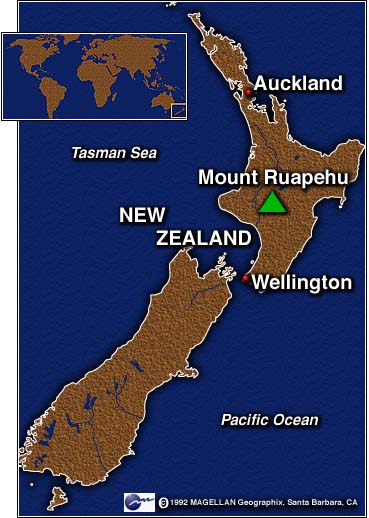
February 7, 2008 - Further evidence that tobacco advertising in stores undermines attempts to stop smoking.. Professor Janet Hoek of Massey University, who led the study, said, "A strong theme of the 20 participants' views was that prohibiting retail displays of tobacco would protect young people." Nearly a third of smokers in the study agreed that removing the displays would help them to quit. There is international evidence that retail tobacco displays and other forms of retail marketing increase susceptibility to smoking, the commencement of smoking by children, and the establishment in children's minds of smoking as a "normal" behaviour. Australian research published last year found that 40 per cent of smokers who were trying to stop or reduce smoking were tempted to buy a pack when they saw a retail display. Click on image to enlarge.. - Some related news briefs: Youth exposed to smokeless tobacco ads despite settlement…, Ireland to ban tobacco displays.., an Nova Scotia (NS) - ban on point of sale tobacco advertising.. Cigarette retail marketing practices increase the likelihood of youth smoking.. . Click on image to enlarge..
Read more...
Ban on smoking in cars when children are present..
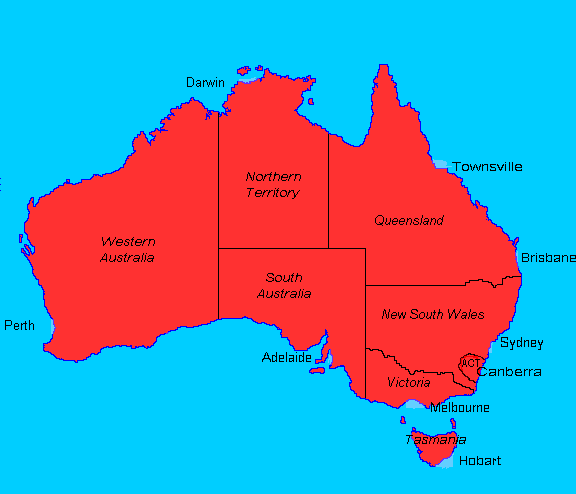
February 7, 2008 - Ban on smoking in cars when children are present.. Premier John Brumby told Parliament yesterday that he would consider introducing such a ban on smoking in cars when children are present. — long sought by anti-smoking campaigners. (John Mansfield Brumby, Australian Labor Party politician, is the 45th Premier of Victoria, assuming office in July 2007.) He was responding to Nationals leader Peter Ryan, who asked whether the Government would take up the rural party's suggestion to ban cigarette smoking in motor vehicles while a child was present. "As part of developing that strategy, the Government will consider all of the relevant views from stakeholders and interested parties, and the views which the leader of the National Party has offered up today would be considered as part of that discussion," Mr Brumby said. Quit Victoria says surveys of smokers have found that 90% would support such a ban. (The organization Quit Victoria is dedicated to eliminating the pain, illness and suffering caused by tobacco.) Some related news briefs: In 2008 will the politicians do what's right for the State of South Carolina??, N.S. Bans Smoking in Cars with Kids.. and California bans smoking in cars with kid. Click on image to enlarge..
Read more...
With less restrains PMI looks to the future..
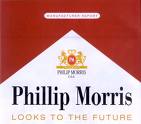 February 7, 2008 - Spinoff - Philip Morris International free from the marketing rules and legal clouds handing over the U.S. tobacco market wil be able to pursue new products that will be off-limits in the U.S. In developing countries, where smoking is on the increase, to appeal to customers in these emerging markets, PMI is making sweet-smelling cigarettes that contain tobacco,cloves and flavoring - with twice the tar and nicotine levels of conventional U.S. cigarettes. From http://SNUS.biz: In Indonesia, Dji Sam Soe, Philip Morris-owned Sampoerna's flagship best-selling brand, has twice the amount of nicotine and three times the amount of tar of a conventional cigarette. Information on some of these new products. In developing countries to appeal to customers in these emerging markets, PMI is making sweet-smelling cigarettes that contain tobacco, cloves and flavoring - with twice the tar and nicotine levels of conventional U.S. cigarettes. The World Health Organization is soon to release a report that may offer a road map to combat tobacco use globally. - Incomplete..
Read more...
February 7, 2008 - Spinoff - Philip Morris International free from the marketing rules and legal clouds handing over the U.S. tobacco market wil be able to pursue new products that will be off-limits in the U.S. In developing countries, where smoking is on the increase, to appeal to customers in these emerging markets, PMI is making sweet-smelling cigarettes that contain tobacco,cloves and flavoring - with twice the tar and nicotine levels of conventional U.S. cigarettes. From http://SNUS.biz: In Indonesia, Dji Sam Soe, Philip Morris-owned Sampoerna's flagship best-selling brand, has twice the amount of nicotine and three times the amount of tar of a conventional cigarette. Information on some of these new products. In developing countries to appeal to customers in these emerging markets, PMI is making sweet-smelling cigarettes that contain tobacco, cloves and flavoring - with twice the tar and nicotine levels of conventional U.S. cigarettes. The World Health Organization is soon to release a report that may offer a road map to combat tobacco use globally. - Incomplete..
Read more...
C-store news - R.J. Reynolds Tobacco (RJR) is removing more Camel SNUS signs by the gasoline pumps..

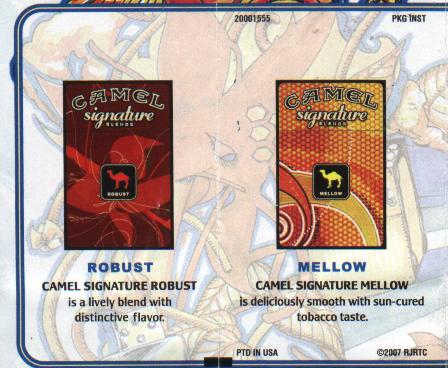
February 6, 2008 - The new signs now promote the Camel Signature blends providing 4- cigarette flavors: frost,infused,robust and mellow. On January 11, 2008 we reported that at this same c-store that RJR replaced the large Camel SNUS sign at the entrance with a Camel No. 9 sign. Camel SNUS along with the other SNUS products being test marketed in the U.S. have not sold well and the majority of smokers have rejected this alternative tobacco product. Click on image to enlarge.. (TobaccoWatch.org)
Read more...
Altria (Philip Morris USA) - UST Deal Debate - Analysts differ on possible acquisition of smokeless tobacco company..
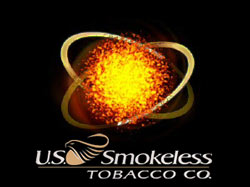
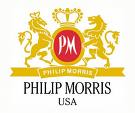 February 5, 2008 - Altria (Philip Morris USA) - UST Deal Debate - Analysts differ on possible acquisition of smokeless tobacco company.. Altria has been seen for years as poised to make an acquisition in the smokeless tobacco market. Altria CEO Louis Camilleri has said that much of Altria's U.S. growth will come from an "adjacency strategy," where the company focuses on noncigarette products, such as smokeless tobacco. See related news brief below: With organic (internal) development in the smokeless tobacco arena failing look for Philip Morris USA to expand through acquisitions.. PM USA's organic entries in the smokeless tobacco category have stumbled and buying UST (principal subsidiaries: U.S. Smokeless Tobacco Company and Ste. Michelle Wine Estates) would give Altria an instant boost in that market. UST is the world leader in smokeless tobacco products; their popular brands Copenhagen and Skoal are each worth more than $1 billion at retail. In the fourth-quarter of 2007 UST profits posted a 1.4% rise, but suffered a decline in market share for its core smokeless tobacco business. (This decline is most likely caused by increased interest in the moist snuff deep-discount tier products like Swedish Match's Longhorn or Conwood's Grizzly - TW.) Conwood Co., the second largest maker of smokeless tobacco products in the U.S., was acquired by Reynolds American acquired in May 2006; , Conwood’s moist snuff products are Kodiak in the premium tier and in the Grizzly in the deep-discount tier. Moist snuff accounts for about 75% of the Conwood's business. It should be remembered that smokeless tobacco sales have a long way to go to catch up with cigarette sales. An estimated 371 billion cigarettes were consumed in the United States in 2006 and cigarettes account for more than 90 percent of expenditures on all tobacco products in the U.S. Total United States expenditures on tobacco were estimated to be $88.8 billion in 2005 of which $82 billion were spent on cigarettes. (TobaccoWatch.org)
February 5, 2008 - Altria (Philip Morris USA) - UST Deal Debate - Analysts differ on possible acquisition of smokeless tobacco company.. Altria has been seen for years as poised to make an acquisition in the smokeless tobacco market. Altria CEO Louis Camilleri has said that much of Altria's U.S. growth will come from an "adjacency strategy," where the company focuses on noncigarette products, such as smokeless tobacco. See related news brief below: With organic (internal) development in the smokeless tobacco arena failing look for Philip Morris USA to expand through acquisitions.. PM USA's organic entries in the smokeless tobacco category have stumbled and buying UST (principal subsidiaries: U.S. Smokeless Tobacco Company and Ste. Michelle Wine Estates) would give Altria an instant boost in that market. UST is the world leader in smokeless tobacco products; their popular brands Copenhagen and Skoal are each worth more than $1 billion at retail. In the fourth-quarter of 2007 UST profits posted a 1.4% rise, but suffered a decline in market share for its core smokeless tobacco business. (This decline is most likely caused by increased interest in the moist snuff deep-discount tier products like Swedish Match's Longhorn or Conwood's Grizzly - TW.) Conwood Co., the second largest maker of smokeless tobacco products in the U.S., was acquired by Reynolds American acquired in May 2006; , Conwood’s moist snuff products are Kodiak in the premium tier and in the Grizzly in the deep-discount tier. Moist snuff accounts for about 75% of the Conwood's business. It should be remembered that smokeless tobacco sales have a long way to go to catch up with cigarette sales. An estimated 371 billion cigarettes were consumed in the United States in 2006 and cigarettes account for more than 90 percent of expenditures on all tobacco products in the U.S. Total United States expenditures on tobacco were estimated to be $88.8 billion in 2005 of which $82 billion were spent on cigarettes. (TobaccoWatch.org)
Read more...
With organic (internal) development in the smokeless tobacco arena failing look for Philip Morris USA to expand through acquisitions..
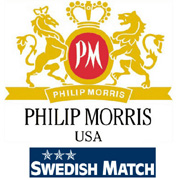 February 4, 2008 - The initial entry in the Snus category Taboka Tobaccopaks did not preform well and is being pulled in the only test market of Indianapolis. Contrary to what Louis Camilleri, chairman and CEO for Altria tells us about Marlboro MST (moist smokeless tobacco) tobacco analysts indicate that the product is not doing well. Marlboro Snus being test marketed in the Dallas/Ft. Worth area and in Indianapolis starting in March has not sold well and the majority of smokers have rejected this alternative tobacco product. Tobacco companies are in agreement for SNUS to catch on and be a strong seller it's going to require more public awareness and education. Remember nine of 10 smokers who try smokeless tobacco reject the product. In September 2007 Swedish Match the maker of Red Man chewing tobacco entered the premium price snuff market for a second time with Red Man Premium Moist Snuff (tagline "An American Experience"). It will be interesting to see if this moist snuff item catches on. Tobacco industry history clearly shows that it is difficult to extend brands from one category to another even if it happens to be the name Marlboro the most popular cigarette in the world or Red Man, the No. 1 loose leaf chewing tobacco. To gain a foothold in the tobacco flavored cigar category good citizen PM USA recently acquired John Middleton, Inc. maker of Black & Mild (B&M) Cigars (second largest selling machine-made cigars in the United States)which is very popular with young African Americans. B&M is the most popular brand of cigars for smokers 12 and older. Nearly a quarter of 18- to 24-year-old blacks in the Baltimore smoke B&M cigars. "The newest addition to the B&M cigars combines the character of wine with the smooth taste and wonderful aroma that is vintage Middleton pipe tobacco." (See ad that appeared in the Sunday (2/3/2008) Raleigh News & Observer.) It has been rumored that once the spinoff of PMI happened PM USA may acquire Swedish Match (Svenska Tandsticks). Besides Red Man Premium Moist Snuff Swedish Match already competes in the price value tier with Timber Wolf and the deep discount tier with Longhorn. There is also a good chance that Reynolds American Inc (RAI) will try to buy the cigar manufacturer, Swisher International. (TobaccoWatch.org)
Read more...
February 4, 2008 - The initial entry in the Snus category Taboka Tobaccopaks did not preform well and is being pulled in the only test market of Indianapolis. Contrary to what Louis Camilleri, chairman and CEO for Altria tells us about Marlboro MST (moist smokeless tobacco) tobacco analysts indicate that the product is not doing well. Marlboro Snus being test marketed in the Dallas/Ft. Worth area and in Indianapolis starting in March has not sold well and the majority of smokers have rejected this alternative tobacco product. Tobacco companies are in agreement for SNUS to catch on and be a strong seller it's going to require more public awareness and education. Remember nine of 10 smokers who try smokeless tobacco reject the product. In September 2007 Swedish Match the maker of Red Man chewing tobacco entered the premium price snuff market for a second time with Red Man Premium Moist Snuff (tagline "An American Experience"). It will be interesting to see if this moist snuff item catches on. Tobacco industry history clearly shows that it is difficult to extend brands from one category to another even if it happens to be the name Marlboro the most popular cigarette in the world or Red Man, the No. 1 loose leaf chewing tobacco. To gain a foothold in the tobacco flavored cigar category good citizen PM USA recently acquired John Middleton, Inc. maker of Black & Mild (B&M) Cigars (second largest selling machine-made cigars in the United States)which is very popular with young African Americans. B&M is the most popular brand of cigars for smokers 12 and older. Nearly a quarter of 18- to 24-year-old blacks in the Baltimore smoke B&M cigars. "The newest addition to the B&M cigars combines the character of wine with the smooth taste and wonderful aroma that is vintage Middleton pipe tobacco." (See ad that appeared in the Sunday (2/3/2008) Raleigh News & Observer.) It has been rumored that once the spinoff of PMI happened PM USA may acquire Swedish Match (Svenska Tandsticks). Besides Red Man Premium Moist Snuff Swedish Match already competes in the price value tier with Timber Wolf and the deep discount tier with Longhorn. There is also a good chance that Reynolds American Inc (RAI) will try to buy the cigar manufacturer, Swisher International. (TobaccoWatch.org)
Read more...


To Provide Public Awareness
Purpose
About Us
Contact Us
2008 HIGHLIGHTS
TOPIX PAPERS - 2008 & 2009..
Archive
-
▼
2008 (578)
-
▼
02/03 - 02/10 (8)
- WHO Report on the Global Tobacco Epidemic 2008..
- Vindicating its move into smokeless tobacco produc...
- Further evidence that tobacco advertising in store...
- Ban on smoking in cars when children are present..
- With less restrains PMI looks to the future..
- C-store news - R.J. Reynolds Tobacco (RJR) is remo...
- Altria (Philip Morris USA) - UST Deal Debate - Ana...
- With organic (internal) development in the smokele...
-
▼
02/03 - 02/10 (8)